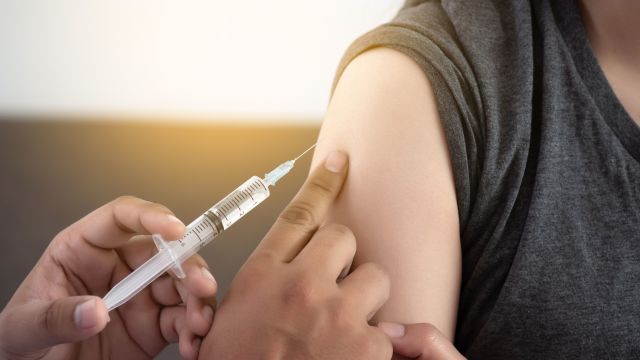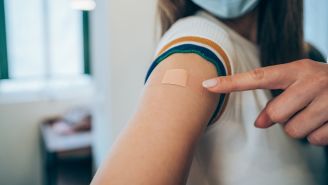Updated on October 31, 2023.
Human papillomavirus (HPV) is a sexually transmitted virus that can cause genital warts and cancers of the cervix, vagina, vulva, and penis, among others. More than 42 million Americans are currently infected with disease-causing types of HPV, according to the Centers for Disease Control and Prevention (CDC). In fact, almost all people who are sexually active are exposed to it at some point in their lives, says Michael Liao, MD, an OBGYN with Summerville Women’s Care in South Carolina.
Thankfully, though, the HPV vaccine can prevent most of these cancers from developing. In fact, the CDC estimates that about 33,700 of the 36,500 cancer cases that occur in the United States as a result of HPV infection every year can be prevented with the vaccine.
Although most HPV infections never cause any symptoms or serious problems and will go away on their own within two years, it’s important to take precautions with regular screenings and vaccinations. They could save your life—or the life of a loved one.
What is HPV and how does it spread?
HPV is the most common sexually transmitted infection in the United States. It is actually a collection of more than 200 associated viruses, 13 of which can cause cancer. Some types of HPV cause warts or skin growths and some may never lead to any health issues at all.
“Some of the strains are little nuisance types of viruses that don't do much and some of them are cosmetically distressing,” says Dr. Liao. “But more significantly, certain strains are what we call high-risk in terms of how they damage DNA and make the cells grow abnormally, and they can contribute to cancer.”
A total of 40 strains are spread through direct sexual contact—in other words, the intimate skin-to-skin interaction that comes from vaginal, anal, or oral sex. If you have sex with someone who has HPV, you can get it even if your partner doesn’t have any symptoms. Other strains, such as those that cause warts on areas like the hands and feet, can be transmitted by touching surfaces.
What is the HPV vaccine?
The immunizations that protect against HPV encourage the body to make antibodies, which are proteins used by the immune system to fight viruses. If these antibodies are ever exposed to HPV, they bind to the virus and prevent it from invading the body’s cells.
There are three different vaccines for protection against infections associated with HPV approved by the U.S. Food and Drug Administration (FDA): Gardasil, Gardasil 9, and Cervarix.
All of the vaccines protect to varying degrees against the HPV types associated with cervical cancer and other cancers, including anal, oropharyngeal (back of the throat), vulvar, vaginal, and penile cancer. Only Gardasil 9 is now used in the U.S., however, as it provides the broadest coverage. The other two are still used in other countries around the world.
Who should get vaccinated—and when?
All children should receive the two-dose HPV vaccine between the ages of 11 and 12, although it may be given as early as age 9. If your teen hasn’t gotten the vaccine yet, talk to their healthcare provider (HCP) about getting it as soon as possible. After age 14, three shots are needed instead of two.
“It’s important for young people to remember that even if they missed their early dose of the vaccine, they should still consider getting vaccinated because there are lots of different strains out there,” says Liao. “While the vaccine won't necessarily go back and reverse the course of the prior exposure, it can help prevent future exposures from other strains that they haven't been exposed to yet.”
People who have not previously been vaccinated can also receive the vaccine up to age 26, but it’s worth noting that being vaccinated at older ages is less effective for lowering cancer risk. In special circumstances, an HCP may recommend that someone receive the vaccine up until age 45.
Regular screenings are important, too
Not all cancers associated with HPV have screening options available. These include anal, penile, and oropharyngeal cancers.
But there is one very important screening method for people assigned female at birth: In addition to getting the HPV vaccine, it’s imperative to get regular cervical cancer screenings in the form of Pap smears, as well as a specific HPV test. The American College of Obstetricians and Gynecologists’ guidelines are as follows:
- Ages 21 to 29: Pap smear every three years
- Ages 30 to 65: Pap smear alone every three years, or specific HPV test every five years, or Pap smear plus HPV testing every five years
Sometimes, your OBGYN may suggest an HPV test as a follow-up if your Pap smear comes back abnormal, says Liao.
When it comes to screenings and testing, it’s important to talk with your HCP. How often you need a Pap smear depends on your age and health history. It’s also important for everyone to have routine checkups with their primary care physicians.
If you get the HPV vaccine, it’s likely you’ll be protected against most cancers and other diseases HPV can cause. But if you notice genital warts, see your HCP.
People who have irregular vaginal bleeding (such as bleeding after menopause or after sex), abnormal discharge between periods, or pain while having sex should see their OBGYN. Although these symptoms can be signs of many other conditions, they could be signs of cervical cancer or precancers.
The best thing you can do to protect yourself against HPV and the conditions related to it is to be proactive. The HPV vaccine is extremely effective when taken well before someone becomes sexually active, so it’s best to get vaccinated as a preteen or young adult. Continuing regular screenings is important, too.
“If you’re going to your primary care physician and OBGYN regularly, your providers should be able to detect any problems before they become too significant,” says Liao.







